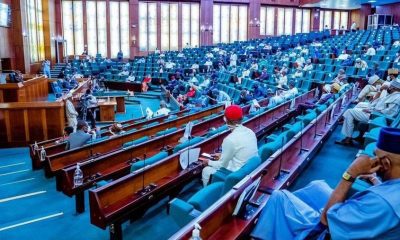Headlines
BREAKING: CBN Reportedly Fires NIRSAL MD, Directors

In a shocking turn of events, the Central Bank of Nigeria (CBN) has reportedly dismissed the Managing Director (MD) and directors of the Nigeria Incentive-Based Risk Sharing System for Agricultural Lending (NIRSAL). Full details inside.
Reportedly, the Governor of the Central Bank of Nigeria (CBN), Mr. Olayemi Cardoso has demanded a significant leadership change at NIRSAL Plc – where key members holding executive positions have allegedly been ousted. The shake-up disrupts affairs within one of Africa’s largest agricultural financing bodies and stirs conversation surrounding its future prospects under new management.
As per an anonymous insider who disclosed to the Saturday Telegraph, three high-ranking executives have been dismissed from their positions.
As per reports, the Managing Director and Chief Executive Officer Abbas Masanawa, along with Kennedy Nwaruh-Executive Director of Operations-and Olatunde Akande-Executive Director of Technical have been impacted.
NIRSAL employees are experiencing heightened anxiety due to the unanticipated leadership shift, prompting concerns that it may initiate a wider array of job cuts within the company.
READ ALSO: Naira Depreciates by N30 Against Dollar Weekly Amid CBN Retail Dutch Auction System
According to the source, we received notification of the changes by email on Friday evening. Although a board meeting was originally planned for that morning, it ended up being called off which has left us unsure about what will happen next. However, further information is expected to become available by Monday.
NIRSAL Plc is a non-bank financial organization under the ownership of CBN, designed to reshape, evaluate and supervise agribusiness credit risk in Nigeria. However, the company has been plagued with accusations of corruption lately; its former Director Mr Aliyu Abdulhameed is facing charges from Economic and Financial Crimes Commission (EFCC).
To avoid conviction in Abdulhameed’s case, a private consultant returned ₦1.5 billion to the EFCC recently.
The funds were pursued by the EFCC for interim forfeiture, alleging that they were gained through illegal means. Nevertheless, the consultant and Abdulhameed contended that the money was acquired in a lawful manner via a contract endorsed by NIRSAL’s board.


